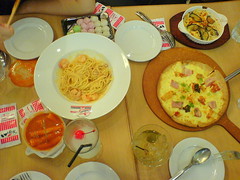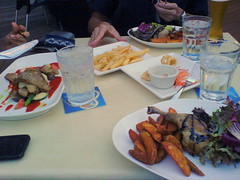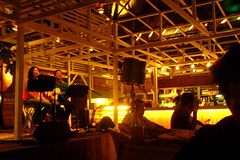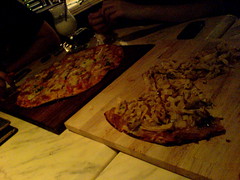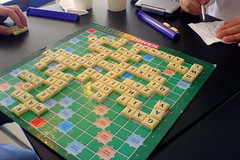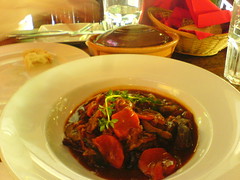Simulacra of Tapas and Geylang Prostitutes. Real Pho Dinner and Shrewd Dishonest Manager
(Due to real life being lived, this post is a week late.)
Another normal weekend in these parts.
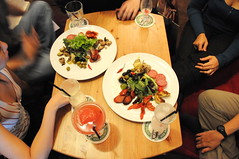
Intended dinner turned mere pre-dinner snacks at Zsofi Tapas Bar where six hungry people were presented with two tasting platters 40 minutes after ordering them,

waited 20 more minutes for the free (miniscule) tapas that accompanied drinks orders, then having been told to wait another half hour for seconds, left in search of proper Indian.
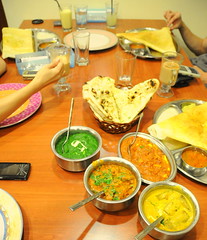
Real dinner at Raj Prime Vegetarian Restaurant, Syed Alwi Road.
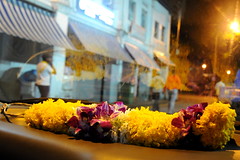
Still smiling stupidly in post-prandial happiness, the passengers garlanded my dashboard with marigolds and jasmine and orchids ("It's good luck!" and "Don't kill us!") and bid me to drive on to Geylang, where actors were needed in a Tisch Film School project in a movie about prostitutes and murder.
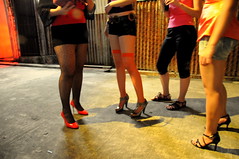
The crew had set up shop in a back alley in Singapore's known redlight district. The residents were confrontational ("What is that red light doing in my backyard?", "This is a residential area you know!", "Who gave you permission to film here?", "Do you have a permit?") and threatened to call the police. They failed to make good on their threat but at 5am, rang the fire brigade to put out a distinctly New Yorkian hobo trashcan fire. Lacking the ability to look seedy, I helped do promotional movie stills for the film.

The next night, a very nice homecooked pho and Vietnamese rolls dinner, theories about Hairspray being a hit due to "90% of Caucasians" having fat asses, Kung Fu Panda on Wii, Scene It? outing the one person who knew all the classics and another person being amazingly ace at anagrams then the presentation of Guitar Hero: World Tour as a birthday present!
The next morning, David Cook spoke on Luke 16 ending off memorably with an illustration involving red and green stickers.
Own notes on Luke 16:
Interpretation of Parables
Parables are not allegories (not "X" = "Y"). They do not require external references. Nor do they require scholarly criticism in the way of New Directions in Pooh Studies.
The first recipients of Jesus' parables were the disciples and the myriad crowd of educated Pharisees and uneducated fishermen who'd gathered to listen to his teachings. Parables appears to be the method by which possibly radical or controversial doctrine was taught (cf Nathan's method of rebuke in 2 Samuel 11 – 12). Parable pills would also have helped to ease digestion of those teachings.
Parables make only a few points. The passage usually clues us in on what this is. It is usually advisable not to read too much into the unimportant details of the parable. We need to work out its main point(s).
However, we do not come upon parables in isolation. Each Gospel writer has taken factual information and edited it into his Gospel in different ways to illuminate different nuances of the same truth. Therefore, the interpretation of a parable would require a consideration of its context in its particular Gospel.
Luke 16:1 - 14
Luke 16:1 – 7: Starts with the story of the shrewd manager. An attempt to distinguish between important details and speculative details that Jesus does not dwell on because they do not contribute to his story yields at least one main point: be like the shrewd but dishonest manager (Luke 16: 9)!
(The manager was obviously dishonest. Speculation on whether the charges brought against the manager were right or how exactly the manager was guilty of mismanagement detracts from the narrative flow. The thing we need to know about the manager is that he was dishonest (Luke 16:8).)
How does the dishonest manager demonstrate his shrewdness?
It is clear that the manager is being fired for his financial indiscretion and asked to clear his desk.
(Speculation as to whether the accounts would vindicate or confirm the charges against him is again unnecessary. The manager knows is he being asked to leave the employ of the rich man and is thus energized to embark on his next course of action.)
The manager's plans and actions are meant to contribute to his future security.
(It does not matter whether this meant the grateful debtors would give him work, or put a roof over his head, or let him have a full meal a day.)
The manager gets his master's debtors to forge/alter documents to reflect a state of things greatly to their advantage.
(Yet again, speculation on whether the rich man's auditors would pick up discrepancies in the accounts and inventory, whether it is significant that the manager got the debtors to alter the documents instead of doing it himself, whether the debtors were equally culpable or whether the manager had acted with ostensible authority as agent for the rich man, whether it was actually the rich man who had erred by charging interest (itself a speculative detail), misses the point. As does the projection that the rich man would be hard put to reverse the partial writedown of loans because the relieved debtors would have been so full of gratitude and praise for the generosity of the manager's master that he would lose face by doing so.)
It is obvious that the details of the manager's actions are meant to demonstrate his shrewdness in a time of rapidly impending financial/whole life crisis (Luke 16:8a).
So in what way were the disciples to emulate that mismanager of his master's assets?
Obviously not in his dishonesty (cf Luke 16:10). It must be about making the best (and creative?) use of present resources to secure one's future.
How were they to demonstrate shrewdness in their lives?
Taking action in current life to secure future life. "Make friends for yourselves by means of unrighteous wealth so that when it fails they may receive you into the eternal dwellings" (metaphorical. Uses story elements in the parable just told to communicate the broad concepts behind the story elements in the parable. In same way "Singapore Exports Headed South" does not mean they are going to South Africa or Australia, and "No Worries" does not mean there are no worries in the world.)
Though earthly things are trivial, our attitude to them matters and is an indication of our faithfulness to God and our fitness for having any part in his kingdom. If we are faithful in a very little now, it is an indication that we will be faithful in much; if we are dishonest in a very little, we will be dishonest in much. If we are unfaithful in the unrighteous wealth, we surely will not be entrusted with the true riches. If we have not been faithful in that which is another's, we will not be given that which is our own. (Luke 16:10-12)
What is Jesus teaching in 16:13?
Can't serve God and wealth. If we think we can multi-task by serving both, we are really just serving wealth. It is all too easy to serve wealth. After all, it can be seen, smelt, touched, and seems to give us security, comfort...for now...
How does Luke 16:13 add to our understanding of what it means to be shrewd?
Qualifies what it means to take current action to secure future, what it means to be faithful now: to do with serving God.
Again, we have to remember that the teaching point of this section is that the children of God are to be shrewd about eternal things (cf laying up treasure in heaven – Matthew 6:20, 1 Timothy 6:19). This does not imply that salvation from God's judgement or entry into heaven is by means of good works.
Negative example of Pharisees in Luke 16:14 – more interested in being accepted by men than by God. Actually scoffing at God. Cook explained that laying up treasure now instead of treasure in heaven is like stocking up on Monopoly money to buy coffee - not legal tender. When we stand before God in the eternal dwellings and are asked to empty out our pockets will we have legal tender? We should not be afraid of asking people for funding for our ministry because we will be giving them opportunities to invest for eternity.
Another normal weekend in these parts.

Intended dinner turned mere pre-dinner snacks at Zsofi Tapas Bar where six hungry people were presented with two tasting platters 40 minutes after ordering them,

waited 20 more minutes for the free (miniscule) tapas that accompanied drinks orders, then having been told to wait another half hour for seconds, left in search of proper Indian.

Real dinner at Raj Prime Vegetarian Restaurant, Syed Alwi Road.

Still smiling stupidly in post-prandial happiness, the passengers garlanded my dashboard with marigolds and jasmine and orchids ("It's good luck!" and "Don't kill us!") and bid me to drive on to Geylang, where actors were needed in a Tisch Film School project in a movie about prostitutes and murder.

The crew had set up shop in a back alley in Singapore's known redlight district. The residents were confrontational ("What is that red light doing in my backyard?", "This is a residential area you know!", "Who gave you permission to film here?", "Do you have a permit?") and threatened to call the police. They failed to make good on their threat but at 5am, rang the fire brigade to put out a distinctly New Yorkian hobo trashcan fire. Lacking the ability to look seedy, I helped do promotional movie stills for the film.

The next night, a very nice homecooked pho and Vietnamese rolls dinner, theories about Hairspray being a hit due to "90% of Caucasians" having fat asses, Kung Fu Panda on Wii, Scene It? outing the one person who knew all the classics and another person being amazingly ace at anagrams then the presentation of Guitar Hero: World Tour as a birthday present!
The next morning, David Cook spoke on Luke 16 ending off memorably with an illustration involving red and green stickers.
Own notes on Luke 16:
Interpretation of Parables
Parables are not allegories (not "X" = "Y"). They do not require external references. Nor do they require scholarly criticism in the way of New Directions in Pooh Studies.
The first recipients of Jesus' parables were the disciples and the myriad crowd of educated Pharisees and uneducated fishermen who'd gathered to listen to his teachings. Parables appears to be the method by which possibly radical or controversial doctrine was taught (cf Nathan's method of rebuke in 2 Samuel 11 – 12). Parable pills would also have helped to ease digestion of those teachings.
Parables make only a few points. The passage usually clues us in on what this is. It is usually advisable not to read too much into the unimportant details of the parable. We need to work out its main point(s).
However, we do not come upon parables in isolation. Each Gospel writer has taken factual information and edited it into his Gospel in different ways to illuminate different nuances of the same truth. Therefore, the interpretation of a parable would require a consideration of its context in its particular Gospel.
Luke 16:1 - 14
Luke 16:1 – 7: Starts with the story of the shrewd manager. An attempt to distinguish between important details and speculative details that Jesus does not dwell on because they do not contribute to his story yields at least one main point: be like the shrewd but dishonest manager (Luke 16: 9)!
(The manager was obviously dishonest. Speculation on whether the charges brought against the manager were right or how exactly the manager was guilty of mismanagement detracts from the narrative flow. The thing we need to know about the manager is that he was dishonest (Luke 16:8).)
How does the dishonest manager demonstrate his shrewdness?
It is clear that the manager is being fired for his financial indiscretion and asked to clear his desk.
(Speculation as to whether the accounts would vindicate or confirm the charges against him is again unnecessary. The manager knows is he being asked to leave the employ of the rich man and is thus energized to embark on his next course of action.)
The manager's plans and actions are meant to contribute to his future security.
(It does not matter whether this meant the grateful debtors would give him work, or put a roof over his head, or let him have a full meal a day.)
The manager gets his master's debtors to forge/alter documents to reflect a state of things greatly to their advantage.
(Yet again, speculation on whether the rich man's auditors would pick up discrepancies in the accounts and inventory, whether it is significant that the manager got the debtors to alter the documents instead of doing it himself, whether the debtors were equally culpable or whether the manager had acted with ostensible authority as agent for the rich man, whether it was actually the rich man who had erred by charging interest (itself a speculative detail), misses the point. As does the projection that the rich man would be hard put to reverse the partial writedown of loans because the relieved debtors would have been so full of gratitude and praise for the generosity of the manager's master that he would lose face by doing so.)
It is obvious that the details of the manager's actions are meant to demonstrate his shrewdness in a time of rapidly impending financial/whole life crisis (Luke 16:8a).
So in what way were the disciples to emulate that mismanager of his master's assets?
Obviously not in his dishonesty (cf Luke 16:10). It must be about making the best (and creative?) use of present resources to secure one's future.
How were they to demonstrate shrewdness in their lives?
Taking action in current life to secure future life. "Make friends for yourselves by means of unrighteous wealth so that when it fails they may receive you into the eternal dwellings" (metaphorical. Uses story elements in the parable just told to communicate the broad concepts behind the story elements in the parable. In same way "Singapore Exports Headed South" does not mean they are going to South Africa or Australia, and "No Worries" does not mean there are no worries in the world.)
Though earthly things are trivial, our attitude to them matters and is an indication of our faithfulness to God and our fitness for having any part in his kingdom. If we are faithful in a very little now, it is an indication that we will be faithful in much; if we are dishonest in a very little, we will be dishonest in much. If we are unfaithful in the unrighteous wealth, we surely will not be entrusted with the true riches. If we have not been faithful in that which is another's, we will not be given that which is our own. (Luke 16:10-12)
What is Jesus teaching in 16:13?
Can't serve God and wealth. If we think we can multi-task by serving both, we are really just serving wealth. It is all too easy to serve wealth. After all, it can be seen, smelt, touched, and seems to give us security, comfort...for now...
How does Luke 16:13 add to our understanding of what it means to be shrewd?
Qualifies what it means to take current action to secure future, what it means to be faithful now: to do with serving God.
Again, we have to remember that the teaching point of this section is that the children of God are to be shrewd about eternal things (cf laying up treasure in heaven – Matthew 6:20, 1 Timothy 6:19). This does not imply that salvation from God's judgement or entry into heaven is by means of good works.
Negative example of Pharisees in Luke 16:14 – more interested in being accepted by men than by God. Actually scoffing at God. Cook explained that laying up treasure now instead of treasure in heaven is like stocking up on Monopoly money to buy coffee - not legal tender. When we stand before God in the eternal dwellings and are asked to empty out our pockets will we have legal tender? We should not be afraid of asking people for funding for our ministry because we will be giving them opportunities to invest for eternity.
Labels: *Luke
